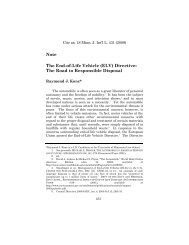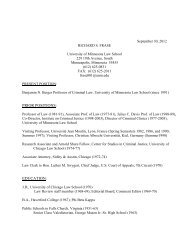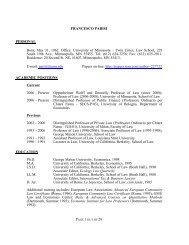Enabling Private Ordering - the University of Minnesota Law School
Enabling Private Ordering - the University of Minnesota Law School
Enabling Private Ordering - the University of Minnesota Law School
Create successful ePaper yourself
Turn your PDF publications into a flip-book with our unique Google optimized e-Paper software.
2009] UMBRELLA CLAUSES 69<br />
creation <strong>of</strong> umbrella clauses as a mechanism that remedies<br />
insufficiencies in <strong>the</strong> enforcement <strong>of</strong> contractual promises <strong>of</strong> <strong>the</strong><br />
host State vis-à-vis foreign investors.<br />
Certainly, understanding <strong>the</strong> jurisdictional function <strong>of</strong><br />
umbrella clauses in such a broad fashion creates certain<br />
problems <strong>of</strong> competing jurisdiction and enables forum shopping<br />
by foreign investors who could potentially seize <strong>the</strong> contractual<br />
forum in a first step and subsequently invoke <strong>the</strong> violation <strong>of</strong><br />
<strong>the</strong> umbrella clause in an investment treaty in case <strong>the</strong> first<br />
proceedings did not yield <strong>the</strong> desired result. However, in order<br />
to deny <strong>the</strong> investor a second bite at <strong>the</strong> apple, such situations<br />
can arguably be dealt with efficiently by concepts such as abus<br />
de droit, res judicata, or estoppel. 185 Likewise, judicial comity or<br />
a broad understanding <strong>of</strong> lis pendens might constitute ways to<br />
avoid parallel and/or subsequent proceedings. 186 On this basis,<br />
one can also justify <strong>the</strong> decision <strong>of</strong> <strong>the</strong> majority in SGS v.<br />
Philippines to stay <strong>the</strong> BIT proceedings in order to have <strong>the</strong><br />
Philippine Court decide <strong>the</strong> dispute already submitted by <strong>the</strong><br />
investor in accordance with <strong>the</strong> contractual forum selection and<br />
square it with <strong>the</strong> contrary approach in Eureko v. Poland, where<br />
<strong>the</strong> investor had not initiated proceedings in conformity with<br />
<strong>the</strong> forum selection clause.<br />
As a matter <strong>of</strong> principle, however, <strong>the</strong> decisions to stay<br />
investment treaty arbitration in order to allow <strong>the</strong> forum chosen<br />
by <strong>the</strong> parties to decide questions <strong>of</strong> contract interpretation and<br />
breach, seems unconvincing not only in terms <strong>of</strong> <strong>the</strong><br />
multiplication <strong>of</strong> proceedings and <strong>the</strong> efficiency and expediency<br />
<strong>of</strong> dispute resolution. It also is incompatible with <strong>the</strong><br />
classification <strong>of</strong> claims for <strong>the</strong> violation <strong>of</strong> umbrella clauses as<br />
treaty claims. Accordingly, claims for <strong>the</strong> violation <strong>of</strong> umbrella<br />
clauses should not be treated differently from claims for <strong>the</strong><br />
violation <strong>of</strong> o<strong>the</strong>r investment treaty provisions, such as fair and<br />
equitable treatment or <strong>the</strong> concept <strong>of</strong> indirect expropriation.<br />
185. See Yuval Shany, Contract Claims vs. Treaty Claims: Mapping Conflicts<br />
between ICSID Decisions on Multisourced Investment Cases, 99 AM. J. INT’L L. 835,<br />
849–51 (2005). Concepts <strong>of</strong> lis pendens <strong>of</strong> res judicata, by contrast, will not be<br />
operative, because <strong>of</strong> <strong>the</strong> different nature <strong>of</strong> <strong>the</strong> contract claim and <strong>the</strong> claim for <strong>the</strong><br />
violation <strong>of</strong> <strong>the</strong> umbrella clause, even though <strong>the</strong> content <strong>of</strong> <strong>the</strong> host State’s<br />
obligation is identical. SGS Société Générale de Surveillance S.A. v. Islamic Republic<br />
<strong>of</strong> Pakistan, ICSID (W. Bank) Case No. ARB/01/13, Decision on Objections to<br />
Jurisdiction, para. 182 (Aug. 6, 2003). For <strong>the</strong> arguments <strong>of</strong> <strong>the</strong> parties on this point,<br />
see id. paras. 46, 52, 60–61, 111–17. Cf. Christer Söderlund, Lis Pendens, Res<br />
Judicata and <strong>the</strong> Issue <strong>of</strong> Parallel Judicial Proceedings, 22 J. INT’L ARB. 301 (2005).<br />
186. Shany, supra note 185, at 849–50.
















